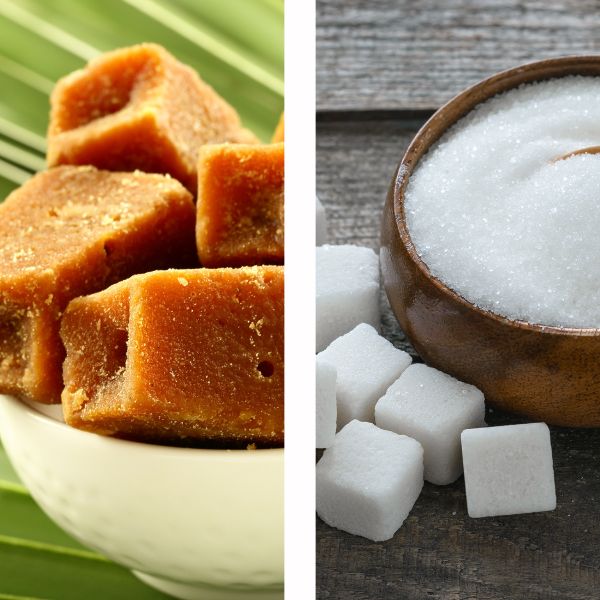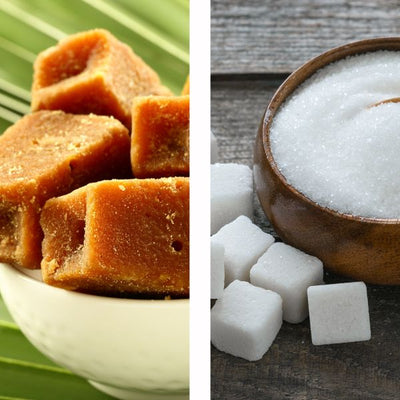
Jaggery Vs. Refined Sugar: Which Is Better?
In today’s quest for healthier dietary choices, there is an ongoing debate between jaggery and refined sugar. Both are popular sweeteners used across the world but they come from different processes and offer distinct health benefits.
Read further to know more about the differences between the two to help you make an informed decision.
Table: Summary Comparison between Jaggery and Refined Sugar
| Jaggery | Sugar | |
| Source | Primarily sourced from sugarcane-is unrefined | Derived from sugarcane- refined |
| Nutrient content | Contains sucrose with minerals, vitamins, and some fiber | Contains sucrose without minerals and vitamins |
| Iron content | Source of iron and is beneficial for preventing anemia | Negligible iron content |
| Respiratory problems | Better for respiratory problems, including colds, coughs, and infection | No benefits |
| Liver cleansing properties | May help cleanse the liver and prevent renal damage | No benefits |
| Digestive properties | Digestive stimulant | May change the gut microbiota |
| Risk of developing diseases | Rich in antioxidants and prevent the risk of certain diseases | No benefits |
Jaggery Vs. Refined Sugar
Jaggery, also known as gur, is a natural sweetener derived from the sap of sugarcane that undergoes minimal processing.
It is made by boiling sugarcane juice until it becomes sticky and retains a significant amount of nutrients. It is known for its notable health benefits.
Refined sugar, also known as table sugar, is produced primarily from sugar cane. It has 99.9% sucrose obtained by removing moisture, color, and nutrition.
Also, it is highly processed and loses all its nutritional value during the preparation. It is devoid of any nutrients or minerals.
Let us now compare the differences between jaggery and refined sugar!
1. Taste
Jaggery has a rustic flavor and texture that goes well with different traditional delicacies. It has a thick texture that may add a creamy touch to the desserts.
In contrast, refined sugar provides a natural sweetness without any distinct flavor profile. It has a granular or powdered texture that may dissolve easily.
2. Nutritional Value
Jaggery retains its nutritional content due to its minimal processing. It has slightly more vitamins, and minerals with a lower sucrose content compared to refined sugar. It makes it effective in preventing various deficiencies and diseases.
Jaggery contains vital nutrients, including zinc, calcium, phosphorus, vitamins, and selenium.
Also, it serves as a potent source of antioxidants that help in improving immunity and reducing the risk of several diseases.
Jaggery is an excellent source of iron and helps to meet your daily iron requirements.
However, it is essential to consume jaggery in moderation as it is a type of sweetener.
In contrast, regular refined sugar provides empty calories due to its high sucrose content and lacks significant nutrients.
It is processed through different refining steps, including extraction, clarification, evaporation, and crystallization.
Nutritional composition of jaggery and sugar (per 100g)
| Jaggery | Sugar | |
| Protein | 280 mg | 0 |
| Calcium | 40-100 mg | 1 mg |
| Magnesium | 70-90 mg | 0 |
| Potassium | 1056 mg | 2 mg |
| Phosphorus | 20-90 mg | 0 mg |
| Iron | 10-13 mg | 0.5 mg |
3. Health Implications
The health implications of consuming jaggery and refined sugar may vary as they differ in their composition and nutrient content.
Iron deficiency
Individuals deficient in iron may suffer from infections, kidney diseases, or autoimmune conditions. It may lead to fatigue, chest pain, light-headedness, and cold hands and feet.
Jaggery may help in reducing the risk of anemia as it is an excellent source of plant-based iron. It can be beneficial for children, older adults, and pregnant women looking to increase their iron intake.
On the other hand, refined sugar is a source of empty calories and lacks any nutritional value. It may not be beneficial for preventing anemia.
Respiratory problems
Jaggery may act as a lung cleanser and prevent respiratory problems that arise from smoking and prolonged exposure to pollution. In Ayurveda, it is recognized for its effectiveness in addressing throat and lung infections.
On the other hand, refined sugar does not offer similar properties in managing conditions, including colds, coughs, and asthma-like conditions.
Liver cleansing properties
Jaggery also acts as a liver cleanser helping to regulate liver function, and removing toxins from the liver.
It may be used to mitigate hepatic and renal damage by reducing oxidative stress.
However, excessive consumption of refined sugar may contribute to the accumulation of fat in the liver and eventually may lead to liver diseases.
Risk of other diseases
Jaggery is packed with antioxidants that aid in building immunity and lowering the risk of developing certain diseases, including rheumatic diseases, abdominal adiposity, weakness, muscle, nerve, and regulating blood pressure.
It may reduce the signs of aging and lower risks of dementia.
In contrast, excessive consumption of refined sugar may cause health-related problems, including dental, stomach problems, diabetes, cancer, and obesity.
It is also associated with a high risk of dental caries and neurodevelopmental disorders in children. Additionally, high levels of refined sugars may cause a feeling of tiredness and lead to skin issues.
Digestive properties
Jaggery is digested slowly and does not release energy as quickly as refined sugar. It helps in keeping you energetic throughout the day. Also, it helps in improving digestion as it is a digestive stimulant.
Further, jaggery assists in weight management as it is rich in potassium content and prevents water retention in the body. It has intestinal anti-inflammatory effects.
On the other hand, refined sugar is readily absorbed in the body and rapidly releases high packs of energy. Also, it may change the microbiota of the gut and increase the gut permeability by increasing the intestinal
barrier.
It may lead to inflammation which in turn may increase the risk of serious health problems, including metabolic disorders, adiposity, and inflammatory bowel disorders.
Overall, jaggery contains traces of minerals and vitamins along with calories whereas sugar provides only calories without any nutrients. But, jaggery should be consumed in small quantities due to its calorie content.
Now that you know the benefits of jaggery, if you are looking for sweet treats that are homemade and sweetened by jaggery, look no further.
You may explore our Humble Flavors laddus here>
About Humble Flavors Homemade Laddus
Our homemade laddus are crafted fresh using recipes that have been passed down through generations.
They are sweetened using natural sweeteners, including jaggery. These laddus have a unique flavor and texture that sets them apart from the sweets made with refined sugar.
The laddus can be enjoyed as a snack, a postmeal dessert, and during festivals and celebrations. Also, they offer certain nutritional benefits compared to treats made with refined sugar.
Our are ideal guilt-free nutritious laddus for your sweet indulgence!
Summary
In conclusion, jaggery offers a more nutrient-rich alternative to refined sugar due to the retained minerals and associated health benefits.
Humble Flavors homemade laddus sweetened with jaggery can cater to your sweet cravings without guilt.
If you have any queries, please leave a comment below and I will respond very promptly.
If you have enjoyed your homemade laddus, please share them with your loved ones!
References
https://www.ncbi.nlm.nih.gov/pmc/articles/PMC6046027/
https://www.webmd.com/diet/jaggery-is-it-good-for-you
https://link.springer.com/article/10.1007/s12355-021-01020-3
https://pubmed.ncbi.nlm.nih.gov/34902573/
https://www.ncbi.nlm.nih.gov/pmc/articles/PMC8314846/
https://pubmed.ncbi.nlm.nih.gov/23758147/
https://www.webmd.com/hepatitis/ss/slideshow-surprising-liver-damage
https://link.springer.com/article/10.1007/s12355-021-01020-3
https://pubmed.ncbi.nlm.nih.gov/36185143/
https://www.researchgate.net/publication/344921769_Jaggery_A_natural_sweetener














